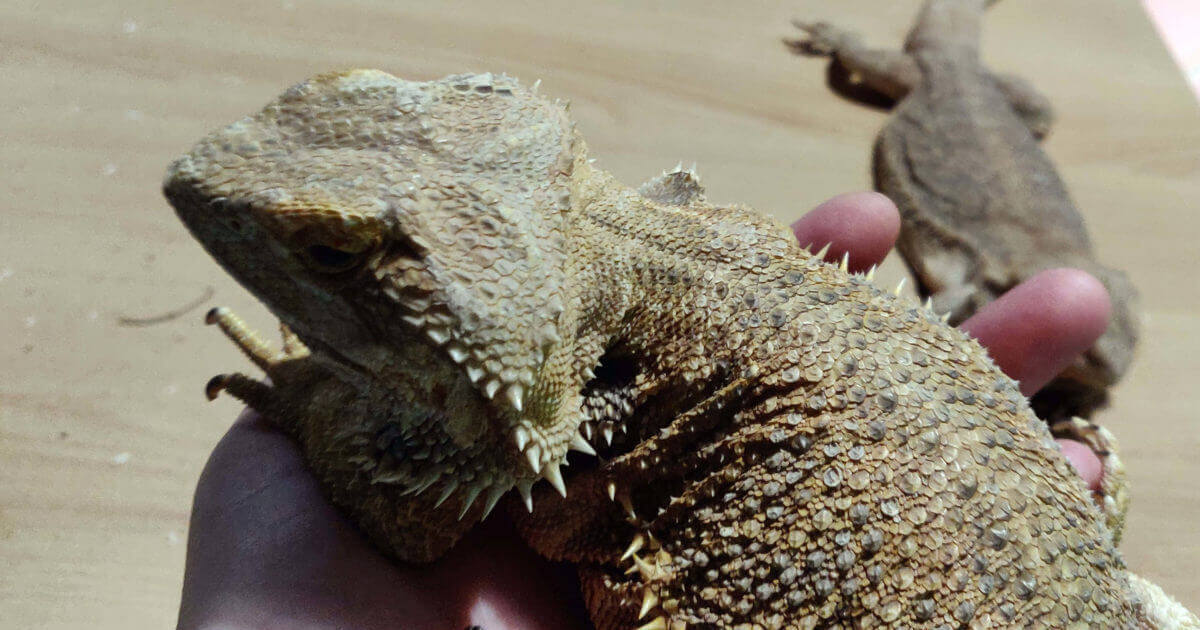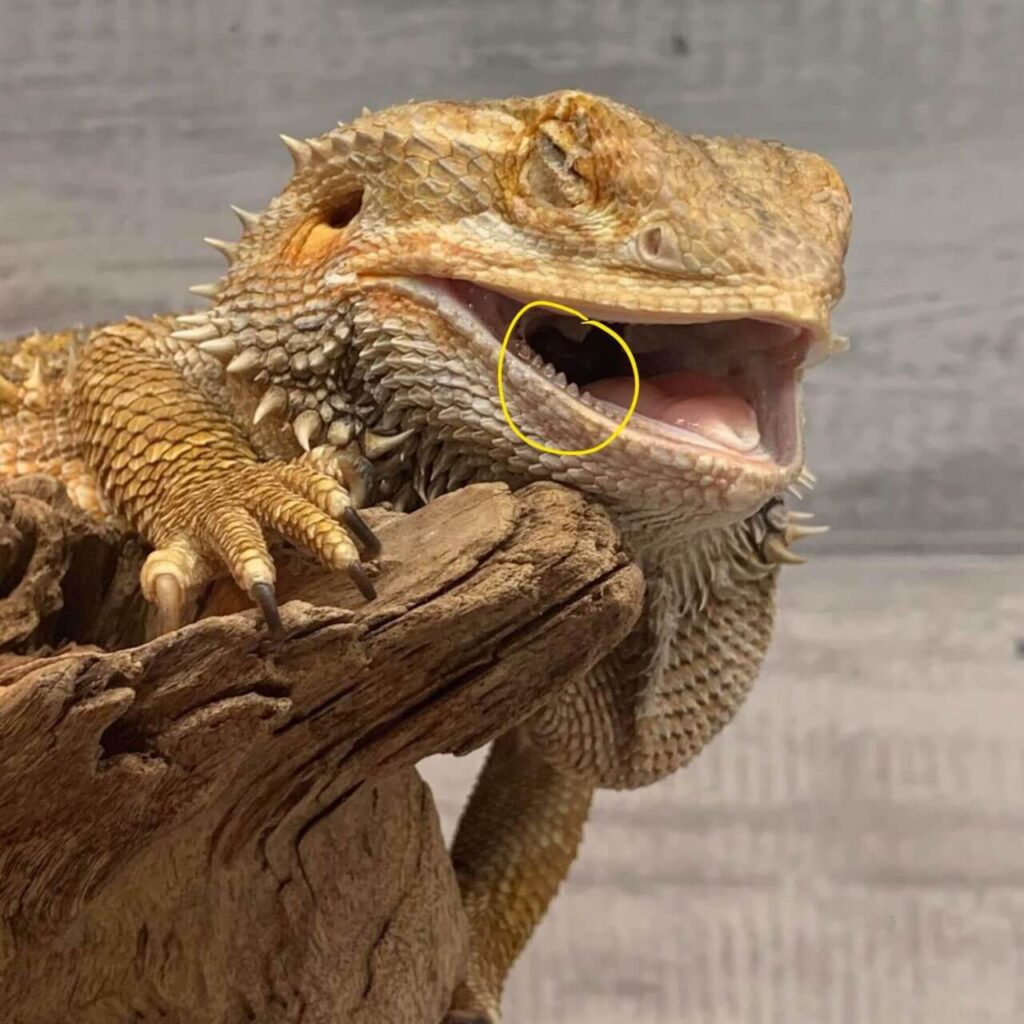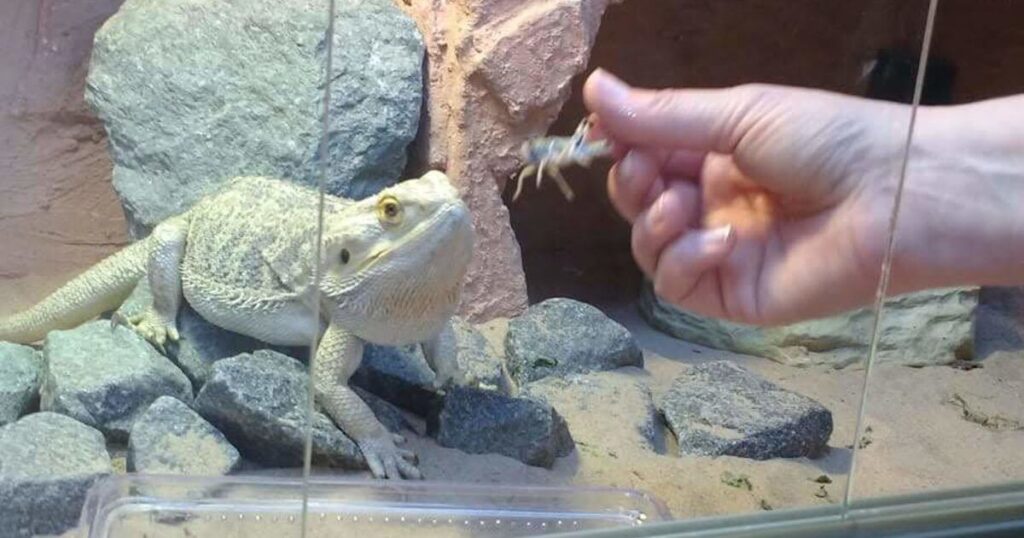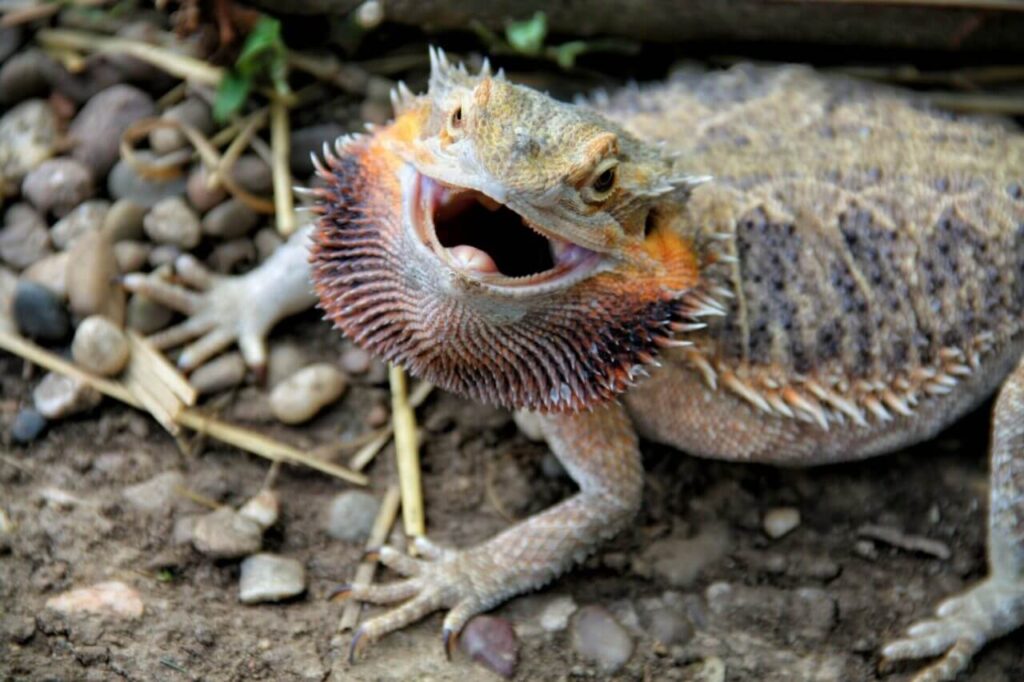Do Bearded Dragons Bite?
Do bearded dragons bite? The answer is yes, but very rarely. Find out why a bearded dragon might bite you and what you can do about it

Last Updated: January 21st, 2023
By: Steve
Table of Contents
Top Questions Related To “Do Bearded Dragons Bite?”
The question “do bearded dragons bite” comes up quite often. It’s rare that a bearded dragon will bite a human but it does happen occasionally. It’s almost never on purpose and there’s various ways to help ensure you don’t get bitten. I’ve never been bitten yet, but Claire has once. It was an accident. But it hurts when it happens!
Do Bearded Dragons Bite?
Yes, sometimes. But rarely. And it’s almost never a malicious thing as Bearded Dragons in general are very placid creatures. For some of the reasons why they might bite see the ‘Why Do Bearded Dragons Bite? question.
Do Bearded Dragon Bites Hurt?
In short, yes. How much depends on where they manage to bite you. Bearded dragons do have teeth. They’re quite sharp and big enough to pierce the skin of your hand or fingers.
A Bearded dragon bite will quite likely draw blood.
You won’t lose a finger though. Their teeth aren’t big enough and their jaw isn’t strong enough to cause serious damage.
Do Bearded Dragons Have Teeth?
Bearded dragons do have teeth – they’re fairly small in comparison to human fingers but they can still give you a bit of a nip if you get caught by them. The picture below shows bearded dragon teeth.

Why Do Bearded Dragons Bite?
A bearded dragon can bite for a number of reasons. The most common of these is an accidental bite. An accidental bite can happen if you’re hand feeding your bearded dragon. Some bearded dragons are very clumsy eaters, ours definitely is. This can mean that they sometimes overshoot their target. If you’re holding their prey then your finger will get bitten instead.
If you’re feeding them something they really enjoy they can get a bit enthusiastic. They can then end up catching your fingers as well as the food. We’ve seen this on occasion when feeding banana to a bearded dragon for example. The banana should be quite small and is likely to be stuck on the end of your finger. Small items stuck to fingers increase the risk of an accidental bite.
Sometimes a bearded dragon will bite you because he mistakes your fingers for prey. If their eyesight isn’t that good for some reason, they’ll see movement and not realise that it’s not prey. Bearded dragons are quite good at trying to eat things that are way too big for them. Your fingers won’t put them off if they think you’re food.
If your bearded dragon feels threatened by you they may bite you on purpose. This is quite rare as bearded dragon’s are generally fairly placid creatures. Like any animal though, they can become stressed or scared on occasion. Back off if they puff their beard up at you or hiss at you as you approach. You should take this as a warning.
Some bearded dragons just aren’t all that tame. Most are, but some just refuse to settle in.
Are Bearded Dragon Bites Venomous?
There is some recent research that suggests that bearded dragons do possess a mild venom.
We don’t believe anyone has ever suffered any long term issues after being bitten by a bearded dragon.
Bearded dragon venom is quite mild and is likely only used to subdue insect prey. We’ve not managed to find all that much research around this though.
Claire has been bitten by our dragons by accident in the past and she’s still living to type and tell the tale!
Ways To Avoid A Bearded Dragon Bite
If your dragon is having trouble with their depth perception, you can help by ensuring their lighting is correctly setup. In particular you’ll need to make sure there are no red lights in their vivarium. Red light definitely appears to impair their depth perception. We’ve just taken on a bearded dragon who had a red light in his vivarium. His depth perception when we first picked him up was appalling. But he does appear to be improving now the red light has been removed. There’s no official scientific evidence to back this up, just our observation at the moment.

Source: beardeddragonsrock.com
If your bearded dragon is excited when you feed them you can use tongs or tweezers to reduce the risk. When feeding locusts or crickets hold them by their back legs with their head a long way from your fingers. Keeping a good distance between you and the prey will reduce the risk of your bearded dragon biting you accidentally.
Your bearded dragon may bite because they feel threatened or aren’t very tame. If you approach them from behind you should reduce your risk. Don’t approach them from above if they’re feeling threatened. They have a light sensitive area on the top of their head. They will sense the shadow of your hand approaching and become even more scared. Most bearded dragon predators live in the sky and swoop down from above to catch them and eat them.

Source: Pixabay
If the bearded dragon you’re keeping isn’t tame you’re going to need a lot of time and patience to be able to approach it. Rescued dragons that have come from homes that have abused them, or haven’t looked after them well often aren’t as tame. Most bearded dragons with gentle and patient handling will come around eventually.
How To Treat A Bearded Dragon Bite
How you treat a bearded dragon bite depends on how the bearded dragon has bitten you.
Quick Bites ( Usually Accidental )
If it’s by accident it’s fairly likely the bearded dragon will let go of you quickly. In which case you should remain calm (easier said than done!) and place them back in their vivarium. Then go and wash your hands well with soap and water. You can also apply some antiseptic cream afterwards to reduce the risk of any infection.
Some bearded dragons can carry salmonella and almost all will carry some form of bacteria in and around their mouth. These bacteria aren’t likely to harm you unless you’re immunosuppressed yourself. Good hand hygiene will reduce your risk to almost zero. You can put a band-aid on to cover the wound if you feel it’s necessary.
Bites Where They Haven’t Let Go
If your bearded dragon has not let go of you remain calm. Sometimes, even with an accidental bite, the bearded dragon cannot let go. Their teeth actually face slightly backwards in their mouth. If you try to pull your hand away while they have you in their mouth you’re pulling your fingers further onto their teeth. This is an evolutionary feature of the bearded dragon to make it easier and less likely for their prey to escape once they’ve caught it.
Support your bearded dragon’s belly with your other hand. Doing this will reduce the weight pulling on their teeth and reduce risk of injury to both you and the bearded dragon. If you can, put a tea-towel or other material over your hand that’s supporting their belly so you don’t get scratched as well as bitten. You can gently try to open their mouth once you’ve supported them well. Their mouths aren’t particularly strong and you should be able to gently pry their mouth open. Remember though that you may have to push your finger in and up a little bit as their teeth face backwards.
It’s not all that easy to pry their mouth apart if your other hand is supporting their belly though. Before trying to open their jaws it’s probably a good idea to sit down and pop them on your leg to support them. You’re going to need to remain calm the whole time otherwise there’s a chance the bite will end up being worse than it would’ve been.
Once they’re off your hand/finger, put them somewhere safe such as their vivarium. You should then wash your hands with soap and water and apply some antiseptic cream or spray.
8 Tips To Avoid Being Bitten By A Bearded Dragon
- Make sure they have the proper lighting to maintain good eyesight
- Hold insects by the back legs if possible, or with worms hold by the tail end.
- Don’t approach hungry lizards from the front.
- If they’re hissing or opening their mouths threateningly, back off.
- Pick them up from behind and don’t approach them over their head.
- Use tongs or tweezers to feed them
- Make sure any fruit you might give them isn’t stuck to your hand
- Wear protective gloves.
